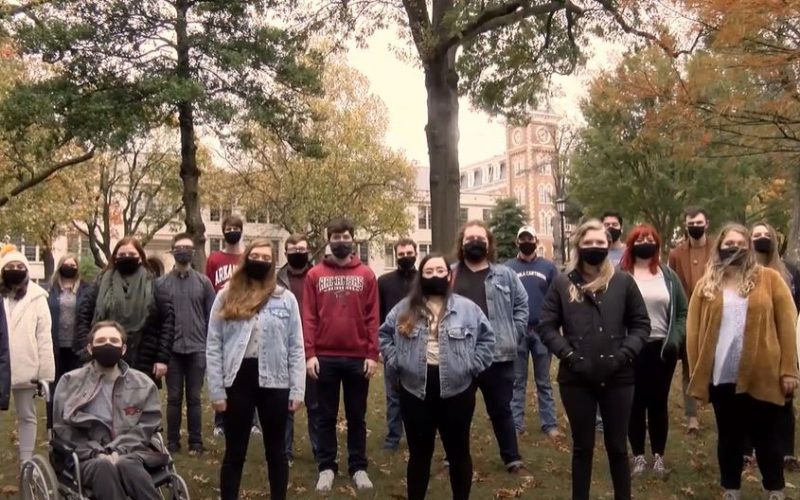Schola Cantorum captures emotions of pandemic
BECCA MARTIN-BROWN
bmartin@nwadg.com
Singers have to sing — especially when they’re the singers of Schola Cantorum, the University of Arkansas’ most elite choir. Founded in 1957, Schola Cantorum has toured the world, has sung for both a president and a pope and was the first American choir to win the coveted first prize — the Guido d’Arezzo Award — at the prestigious International Polyphonic Competition in Arezzo, Italy.
But what happens when a pandemic silences almost all live music?
“What do you do with a choir when they can’t meet, rehearse, or perform? Let them be artists, and sing their truth,” says Schola’s director, Stephen Caldwell.
“We are fortunate to live in a time where technology can be a substitute for many things,” says Caldwell, who has been teaching at the University of Arkansas for eight years. “We can still see our students; we just can’t see them in person. We can still sing; we just can’t sing together in the same room. So I had to adapt the educational model for a new paradigm. Ultimately though, that is what artists have always done: Take what is available, and use it to express a lived experience.”
As covid-19 made headlines in the spring of 2020, Caldwell created a “virtual choir, everyone singing in their little boxes united by software.”

The only time the students of Schola Cantorum have met in person this semester was for the final shot of a project titled “2020: Alone Together.” Their director, Stephen Caldwell, mixed the audio the students had recorded individually and was “cinematographer,” compiling the images the students suggested.
(Courtesy Photo/Stephen Caldwell)
“It filled the hole, but it didn’t fulfill the soul,” he says. “So this summer I spent much time thinking of ways that a virtual experience could do both: fill the educational requirement, and fulfill their need for connection. I had to be able to convince them to sing their truth, and be completely vulnerable, while staring at a sterile laptop screen.”
Caldwell gave his students and himself one break. He did not add new members to Schola.
“Usually we hold auditions in August to replace our graduating singers,” he explains. “This year, I chose not to take new singers, so all 30 voices are returning students from last year. This meant we could tackle an emotionally exposed topic, and the students would trust each other enough to share their experiences because they already knew one another.
“We began the semester with guided discussion on how to write poetry, how to compose, how to improvise,” he goes on. “Given the paint and brushes, they merely needed a canvas. So I sat at the piano and recorded a few short improvisations, simple chords, and had them sing their own truth, their own words, their own experience, over those improvisations.
“Slowly and carefully, we arranged each color of the 30 singers into a canvas that painted a picture none of us ever imagined. From the very moment their improvisations started to come in, I was struck at their honesty, their vulnerability, and their pain. Through all of this, the pandemic, the closures, the isolation, the politics, the uncertainty, these students found ways to keep their eyes on the horizon, to help each other through the darkness, knowing that if they just hold on a little longer, change is coming.
“I told them I had no idea where the project would go. We were going to take a bunch of stuff, throw it at a wall, and see what sticks,” Caldwell says. “Each week, a little more stuck, and the project began to grow in size, scope, and intention.”
The result, just released on YouTube, is titled “2020: Alone Together.”
“Their music,” Caldwell says, “is the literal sound of the pandemic.”
“It’s sunny today,” a lone singer begins. “I miss seeing people.”
As others join in, they comment on “empty stadiums, empty streets, empty hearts,” the “world on pause” and “nature healing from mankind.”
“I fear we’ll never see the light of day
“And yet, I know
“Good is coming.
“Lonely. Empty. Numb. Forgotten.
“I’m lonely. I’m numb. I’m empty.
“It’s sunny today. I miss seeing people.
“Change is coming.”
“Artists create art,” Caldwell says. “It’s what we do. Pandemic be damned.
“Hopefully they learned that they are all artists and can create art.”
__
FYI
Scholar Cantorum:
“2020: Alone Together”










